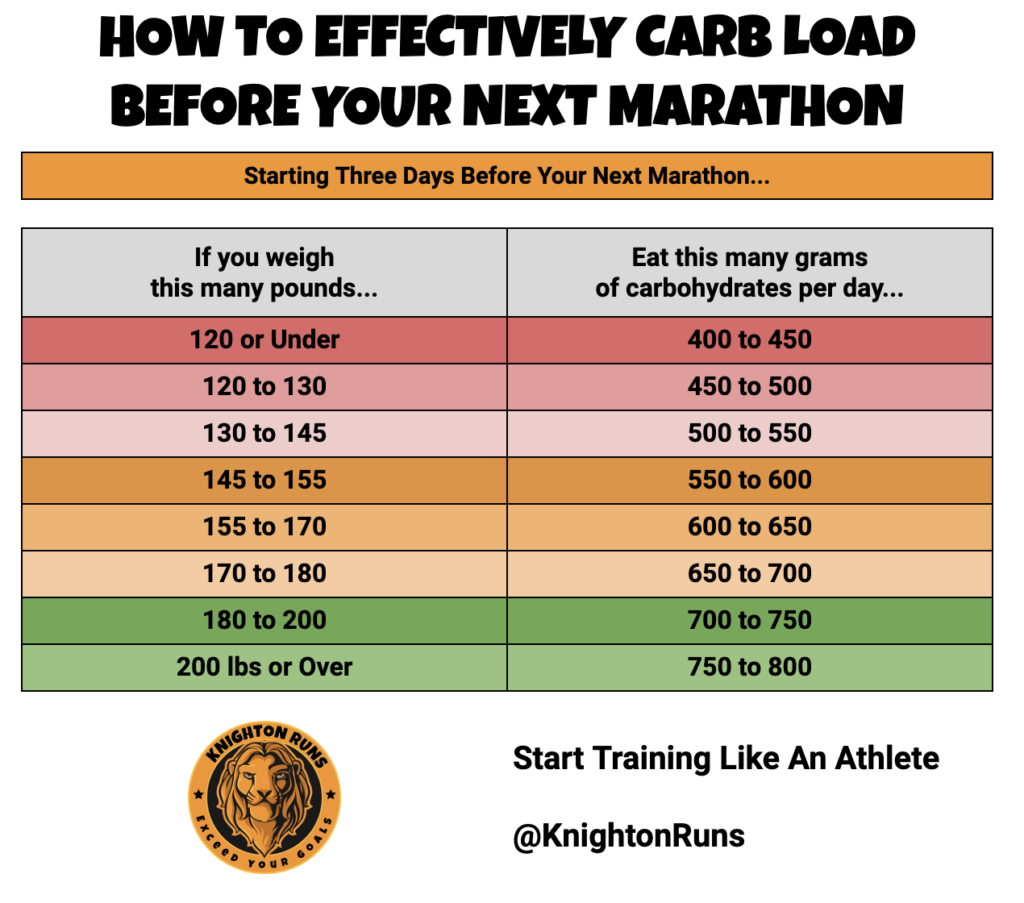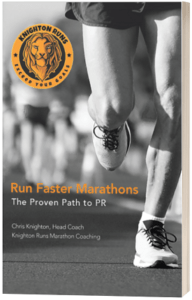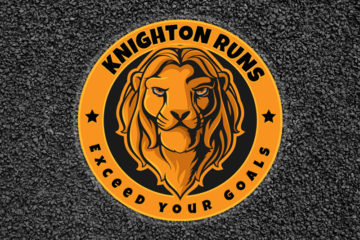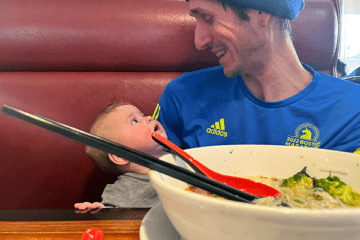How to Properly Carb Load Before a Marathon or Half Marathon
Jump over the wall and finish strong by carb loading effectively before your next race!
By Coach Chris Knighton

Disclaimer: The content on this site is for informational and educational purposes only, and does not substitute professional medical or nutritional advice, or consultations with healthcare or nutritional professionals. Please consult your own qualified doctor or nutritionist before making any changes to your nutrition.
Introduction – Carb Loading for Marathon Runners
In this article, I will teach you all you need to know to effectively carb load before your next marathon or half marathon.
I explain why carb loading is so important for long distance runners and teach you exactly how to do it.
You’ll finish this article knowing a simple plan you can follow step by step to carb load effectively before your next marathon or half marathon.
Watch This Article Be Explained on YouTube
Why Carb Loading is Essential Before a Marathon
Our bodies run on two primary sources of of stored fuel: 1) fat and 2) carbohydrates.
Fat is the primary energy source for powering slower easy-paced running and jogging. Even the leanest of athletes have enough stored body fat to power a near endless number of slow miles. However, stored body fat does not have the capacity to power faster running.
Once an athlete increases their pace from a slow jog to a quicker marathon race pace or faster race pace, the primary source of fuel for powering their run switches from fat to carbohydrates.
However unlike stored body fat, which can fuel countless hours of slow running, our bodies only have the capacity to store roughly 90 to 120 minutes worth of carbohydrates which power fast running.
Marathons take well over 120 minutes, or two hours to complete. For the vast majority of us, marathons will take well over 3 hours to complete.
Since your body only has a carbohydrate fuel tank large enough to power 90 to 120 minutes of race-pace running, then it’s absolutely essential that you start the race with a fuel tank that is 100% full and replenish carbohydrates to the best of your ability during the marathon itself.
If you allow your carbohydrate-store fuel tank to run empty during a marathon, you will suffer the dreaded wall in the second half of your marathon, characterized by feelings of extreme fatigue, heavy legs, increased muscle soreness, cramping, being forced to walk, etc. I’ve been here many times in marathons, trust me… it’s no fun!
The same logic holds true for the half marathon. Athletes who can not complete a half marathon in under 90 minutes risk a complete emptying of their carbohydrate stores before the end of the race. While hitting the wall in a half marathon is generally not as severe as in the full marathon, fueling during the half-marathon is essential to maximize your performance and is a great practice opportunity for athletes who are preparing for a full marathon in the future. Even athletes who can complete a half marathon in under 90 minute should fuel during it to ensure consistent energy levels from start to finish.
Carbohydrate loading before your next race will ensure you start your next marathon or half marathon with a fuel tank that is at 100% capacity.
When Should I Start Carb Loading?
It’s essential that you start to carb load at the right time before your next marathon or half marathon.
I recommend you focus on carbohydrate loading starting 3 days prior to your goal marathon or half marathon.
If you are running a half marathon in the middle of a marathon training cycle, you can also carb load starting three days prior to your half, but carb loading for just two days may be sufficient and can be slightly easier to plan out before a less important race.
How Many Carbohydrates Should I Eat?
I created the table below to help you determine how many carbs to eat per day in the 3 days leading up to your next marathon…

How Do I Know How Many Carbs are in My Food?
It is essential to track your total intake of carbohydrates during your days of carb loading to ensure you are eating enough.
It’s easy to determine how many carbs are in packaged foods. Just read the nutrition facts to find out how many carbs are in a given serving size. Multiply the number of carbs per serving by the number of servings you are eating in that meal to estimate how many carbs you are consuming.
For unpackaged foods, like fruits or vegetables. You can perform a quick Google Search of say, “How many carbs in a banana” to approximate the amount of carbohydrates you are eating. The top result on Google, in this example, tells me there are 27g of carbs in a medium size banana. So you can go with that!
The exact number of carbs you consume doesn’t need to be precise. Recognize that there will be some margin of error in your calculations. This is totally fine and is not worth stressing over as long as your intent is to carbo load and do your best to track your carbohydrate intake.
Again, the point is simply to make sure you are getting lots of carbs and getting close to your target number of carbs per day. It’s okay if you are a little under or a little over your target. If in doubt, aim for eating slightly more carbs rather than less.
Sample 3-Day Marathon Carb Load Meal Plan
This meal plan contains what I personally ate before running a 7-minute personal best of 2:46 at the 2023 Chicago Marathon.
In the week leading up to the Chicago marathon, I weighed approximately 136 pounds, so using the chart above I targeted 500 to 550 grams of carbs.
You can use this meal plan as a sample plan for the next time you carb load and adjust the portion sizes up or down accordingly to meet your specific carbohydrate per day needs.
Disclosure: Some of the links below may be affiliate links, meaning if you click through on a link and buy a product I may earn a small commission for the referral. As an Amazon Associate I earn from qualifying purchases. Buying through these links is a nice small way for you to support what I do.
Day 1 – Three Days Before Marathon / Staying at Home
Breakfast (at home)
1 cup of rolled oats (54g)
1 medium size banana (27g)
1.5 tbs agave syrup (18g)
2 tbs peanut butter (6g)
1 Serving of Gatorade Endurance Formula Powder (22g)
Morning Snack (at home)
3 x Brown Rice Cakes, Lightly Salted (48g)
Lunch (at home)
2 Cups of Homemade Fried White Rice with Vegetables (120g)
1 medium sized banana (27g)
Afternoon Snack (at home)
3 x Brown Rice Cakes, Lightly Salted (48g)
Dinner (at home)
1 x Large French Baguette (150g)
3 x Vegan Sausage Patties (9g)
1/2 cup of Marinara Sauce (8g)
Evening Snack (at home)
2/3 cup of Coconut Ice-Cream (25g)
Total Carbs for Day = 562g
Day 2 – Two Days Before Marathon / Traveling to Race
Breakfast (at home)
1 cup of rolled oats (54g)
1 medium size banana (27g)
1.5 tbs agave syrup (18)
2 tbs peanut butter (6g)
1 Serving of Gatorade Endurance Formula Powder (22g)
Morning Snack (in airport)
3 x Brown Rice Cakes, Lightly Salted (48g)
Lunch (in airport)
12oz Bottle of Lemon-Lime Gatorade (24g)
2 Small Bags of Salted Pretzels (44g)
Afternoon Snack (in airport)
1 medium sized apple (25g)
1 medium sized banana (27g)
Dinner (purchased from grocery store near hotel)
3 Loaves of White Pita Bread (96g)
8oz Plain Hummus (50g)
14 oz Grape Leaves Stuffed with White Rice (77g)
Evening Snack
None
Total Carbs for Day = 518g
Day 3 – One Day Before Marathon / Staying in Hotel
Breakfast (purchased from grocery store near hotel)
2 x Plain Bagels (92g)
2 tbs peanut butter (6g)
1 medium size banana (27g)
16oz of Apple Cider (56g)
Morning Snack (brought from home)
3 x Brown Rice Cakes, Lightly Salted (48g)
Lunch (at restaurant)
Large Entree of Rice Noodles with Vegetables and Tofu from Local Chinese Restaurant (125g)
Afternoon Snack (brought from home)
3 x Brown Rice Cakes, Lightly Salted (48g)
Dinner (from grocery store near hotel)
2 Slices of Vegan Pizza (72oz)
1 Cup of White Rice (45g)
Evening Snack (from grocery store near hotel)
1 Small Glass of Red Wine
1 Sweet Sesame Seed Ball (26g)
Total Carbs for Day = 545g
Conclusion – Carb Loading for Marathon Runners
Carbohydrate loading is one of the best things you can do to set yourself up for a strong and successful marathon from start to finish.
After carb loading for three days following the meal plan listed above, I ran a new personal best in the Chicago Marathon and felt incredible from mile 20 to 26.
I strongly believe that carb loading helped me avoid hitting the wall in the later stages of my marathon and that it’s one of the best strategies you can employ to do the same in your next race.
Now that you know all you need to know to effectively carbohydrate load before your next marathon or half marathon, it’s your turn to apply this knowledge.
Record a food log while you carb load and take notes on how you feel both during the carb loading process and in the marathon itself. Tweak your approach to carb loading before each race based on your notes and experiences from last time. By taking your approach to carb loading seriously you will learn how to overcome the wall and continually improve your marathon preparation and performances over time.
Here’s to you starting your next marathon or half with a fuel tank at 100% capacity!


